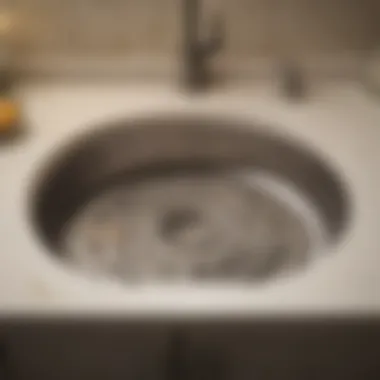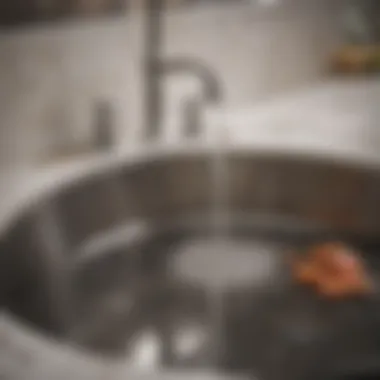Eliminating Unpleasant Kitchen Sink Drain Odors


Intro
Kitchen sink drain odors can be a persistent and annoying issue for many households. These unpleasant smells not only affect the environment of the kitchen but can also be indicative of underlying problems that require attention. Understanding the causes of these odors is crucial for effective resolution.
This guide aims to provide homeowners with a detailed look at why kitchen sink drains can become odorous. It examines different factors that contribute to this problem, from food buildup to plumbing complications. Additionally, this article offers practical solutions and preventative measures to ensure a clean and fresh kitchen environment. By maintaining a proactive approach to drain upkeep, individuals can minimize the risks of unpleasant smells in their homes.
Prolusion to Kitchen Sink Drain Odors
Kitchen sink drain odors are not merely an inconvenience; they can be a significant concern for any household. Understanding the sources of these smells is critical for maintaining a pleasant kitchen environment. These unpleasant odors can stem from various factors, such as food residues or plumbing issues. Addressing these odors effectively enhances not only the hygiene of the space but also the overall enjoyment of cooking and dining.
When one thinks about the kitchen, it is often associated with warmth and family gatherings. However, the presence of foul smells can quickly disrupt that atmosphere. An odor-free kitchen fosters a sense of comfort. This article delves into the intricacies of kitchen sink drain odors, aiming to provide insights into their causes and solutions.
By recognizing the specific elements that contribute to this issue, homeowners can take proactive measures. For instance, understanding that organic material can lead to bacterial growth aids in forming effective cleaning routines. Likewise, considering plumbing maintenance ensures that any underlying issues are dealt with promptly. Therefore, this section lays the foundation for exploring the common causes and effective remedies for kitchen sink drain odors.
Common Causes of Drain Odors
Understanding the common causes of drain odors is essential for maintaining an inviting kitchen environment. Odors from drains can indicate more serious issues that require attention. Recognizing these causes supports a proactive approach to home maintenance. Addressing odors promptly helps prevent the escalation of more significant plumbing problems and enhances overall hygiene in the home.
Food Residues and Organic Material
Food waste can easily accumulate in the sink or within the plumbing. When organic material is left to decompose, it can release unpleasant odors. Leftover bits of food can collect in hard-to-reach areas of the plumbing. They can result in stagnant water and odor development. It is vital to clean sinks regularly to prevent this buildup.
Bacterial Growth
Bacteria thrive in moist environments, such as sinks that have food residues. As bacteria grow, they produce gases that generate unpleasant odors. These odors can be strong and overpowering. Regular cleaning can limit bacterial growth and keep your kitchen smelling fresh. Bleach or vinegar can be used for cleaning to mitigate these smells effectively.
Plumbing Issues
Clogged Pipes
Clogged pipes are a common contributors to drain odors. When pipes are obstructed, water cannot flow freely. This can lead to stagnation and the accumulation of organic material. A key characteristic of clogged pipes is that they create pressure and backflow in the plumbing system. It results in persistent odors. Clogs are often the result of grease, hair, or food particles collecting in the pipes, making it an important focus for homeowners. Regularly clearing the pipes can be beneficial for maintaining good drainage.
Vent Problems
Vent problems can also lead to odors emanating from drains. Vents are necessary for proper airflow in a plumbing system. A blocked vent can create negative pressure, causing drain gases to escape into the kitchen. This situation is less common but can be significant if ventilation is inadequate. Ensuring that the vents are clear and properly maintained can prevent odors from developing and should not be overlooked.
Dry P-Trap
A dry P-trap occurs when water evaporates from the trap. This is a barrier designed to prevent sewer gases from entering the home. If there is no water in the P-trap, these harmful gases can travel up the drain and into your living space. Regular use of the sink ensures that the P-trap maintains enough water to function effectively.
Sewer Gas Leaks


Sewer gas leaks can be a serious source of kitchen odors. These leaks occur from broken or improperly sealed plumbing connections. It poses health risks if not addressed. If there are persistent odors that resemble rotten eggs, they may signal a sewer gas leak. It’s crucial to investigate and resolve these issues quickly to safeguard your health and your home environment.
Remember, early identification of these issues can save significant time and costs in the long run. Keep your drain systems clean and problem-free.
Identifying Drain Odor Types
Understanding the specific types of odors coming from kitchen sink drains is essential for effective resolution. Different odors may indicate different underlying problems that require targeted solutions. Correctly identifying the odor type not only assists in pinpointing the cause but also guides homeowners in choosing the most effective cleaning methods. An informed approach can save both time and effort, leading to a fresher and healthier kitchen environment.
Chemical Odors
Chemical odors in kitchen sink drains often emanate from harsh cleaning agents or unwanted chemical reactions. Such odors may signal the presence of substances like bleach or ammonia mixing with organic materials. It is important to address these odors promptly. They may indicate that your cleaning routines need modification, or there could be residues causing issues. Regularly using milder cleaning products can help minimize the developing of these unpleasant smells.
Fishy Smells
Fishy smells are concerning and suggest organic decay, often linked to food particles trapped in the drain. When fish or protein-rich foods are disposed of in the sink, they can break down and create a foul odor over time. This situation can escalate if not addressed quickly. To mitigate this, one should refrain from putting such food scraps down the drain and utilize disposal systems correctly. Cleaning the sink and drain regularly, especially after using it for fish or meat, can prevent the smell from becoming persistent.
Rotting Garbage Odor
A rotting garbage odor is perhaps the most offensive of all drain smells. It results from decomposing organic matter, which can accumulate in the pipes. This odor typically intensifies when food waste is not disposed of properly or when the drain is clogged. To alleviate this problem, regular maintenance is key. Utilizing tools like sink strainers can prevent larger debris from entering the drain. Additionally, implementing a routine cleaning with baking soda or vinegar can help in breaking down any build-up that leads to this odor.
By identifying the type of odor from your kitchen sink drain, you can take precise actions for cleaning and maintenance, leading to a more pleasant cooking environment.
Assessing the Severity of the Problem
Assessing the severity of kitchen sink drain odors is a crucial step in addressing the issue effectively. Understanding whether the odor is a temporary nuisance or an indicator of a more serious problem can guide homeowners in their actions. Recognizing the nature of the smell can help prevent future complications and the potential escalation of repair costs.
Temporary vs. Persistent Odors
Odors from kitchen sinks can often be classified into two categories: temporary and persistent. Temporary odors may arise from recent food waste or sporadic buildup in the drain. They can often be managed through routine cleaning and maintenance practices such as flushing with hot water or utilizing baking soda and vinegar. If the smell disappears after a thorough cleansing, it is likely a minor issue.
On the other hand, persistent odors demand more attention. They typically suggest underlying plumbing problems such as trapped debris, clogs, or bacterial growth. Persistent smells often indicate a failure to remove organic material, leading to ongoing bacterial proliferation. Homeowners should take these odors seriously, as ignoring them may lead to more significant plumbing issues and hygiene concerns.
When to Seek Professional Help
Homeowners should consider calling a plumbing professional if they experience persistent odors that cleaning measures do not resolve. Professional plumbers are equipped to inspect the plumbing system comprehensively, identifying problems such as pipe blockages, damaged pipes, or venting issues that may not be immediately visible to the homeowner.
Additionally, if the odor resembles sewer gas, it is essential to seek help promptly. Sewer gas is harmful and can present serious health risks if it permeates living spaces. Signs indicating imminent need for professional intervention include a change in the water flow, strange sounds from the pipes, or frequent backing up of water.
"Recognizing when to act can save time and money in the long run. Addressing the problem early can avoid more extensive damage and costly repairs."
Assessing the severity of kitchen sink drain odors is an essential process that aids in determining the appropriate course of action. By differentiating between temporary inconveniences and serious underlying issues, homeowners can manage kitchen environments more effectively, ensuring they remain fresh and welcoming.
Effective Solutions for Eliminating Drain Odors


Addressing kitchen sink drain odors is crucial for maintaining a pleasant environment in the home. These odors can lead to discomfort, impacting the overall cooking and dining experience. By implementing effective solutions, homeowners can significantly reduce unwanted smells. Understanding the methods available to combat these odors also helps in identifying the underlying issues. Each solution can provide distinct benefits while emphasizing the importance of routine maintenance.
Regular Cleaning Practices
Regular cleaning of the kitchen sink area is an effective strategy. Accumulation of food particles often results in odors. Cleaning the sink, including the visible and hidden areas, can prevent buildup. Using a mixture of soap and water is a simple approach to keep it clean.
A clean sink is essential for a hygienic kitchen environment.
Besides, using a scrub brush, especially on hard-to-reach areas, aids in removing any persistent residues. Make it a habit to clean the sink after every use. This lessens the chances for odors to develop over time.
Utilizing Baking Soda and Vinegar
Baking soda and vinegar create a powerful duo in clearing odors. When mixed, they produce a fizzing reaction that can help dislodge buildup. Start by pouring about half a cup of baking soda down the drain, followed by one cup of vinegar. Let the mixture sit for about 10 to 15 minutes, then flush with hot water. This simple method not only neutralizes odors but can also help with minor clogs.
Commercial Cleaning Agents
For more stubborn odors, commercial cleaning agents may be effective. Products like Liquid-Plumr or Drano can break down organic matter more intensively. When selecting a cleaning agent, it's important to follow the instructions carefully and consider the material of your plumbing. While these products can be beneficial, regular use can lead to wear over time. Always balance their use with natural cleaning methods where possible.
Flushing with Hot Water
Flushing the pipes with hot water regularly is an easy yet effective practice. Hot water can help dissolve grease and food particles that contribute to odors. Pouring boiling water down the drain once a week can create a clean and odor-free flow. Make sure not to pour boiling water too frequently, especially if your pipes are older. This can help maintain plumbing integrity.
Routine Maintenance of Plumbing Systems
Checking for Leaks
Checking for leaks is a fundamental part of plumbing maintenance. Leaks can lead to stagnant water, breeding ground for bacteria that causes odors. Regular visual inspection under the sink and around the pipes is important. A small drip can indicate larger issues. Finding leaks promptly can prevent extensive damage and the potential for smell development, making it a beneficial practice.
Ensuring Proper Ventilation
Ensuring proper ventilation is key for preventing odors. A well-ventilated drain allows gases and odors to escape rather than lingering in the kitchen. This can be accomplished by ensuring that the plumbing vent system is functioning well, allowing fresh air to enter the plumbing system, alleviating potential odor issues. Regular inspection can prevent the buildup of gases that contribute to unpleasant smells, clarifying its significance in maintaining an odor-free kitchen.
By actively implementing these strategies, homeowners can tackle the issue of kitchen sink drain odors effectively.
Preventive Measures to Keep Drains Fresh
Preventive measures play a crucial role in maintaining a fresh kitchen environment. Implementing simple strategies can significantly reduce the likelihood of unpleasant odors emerging from kitchen sink drains. Regular attention to these measures fosters a clean and functional space, positively impacting the overall kitchen experience. Homeowners should recognize that consistent practices are often more effective than reactive solutions.
Using Sink Strainers
Utilizing sink strainers is an essential practice to prevent food particles from entering the drain. These strainers are inexpensive and easy to install. They catch loose debris, such as bits of food, which often contribute to foul odors if left to decompose in pipes.
Strainers come in various sizes and materials, making it simple to find one that fits your specific sink. Regularly cleaning the strainer itself ensures accumulated food does not become a breeding ground for bacteria.


Avoiding Certain Disposals
Being mindful of what goes down the disposal can prevent a range of future issues. Certain items should strictly be avoided. For example:
- Fibrous vegetables like celery
- Starchy foods such as pasta and rice
- Large bones or pits
These items can create clogs or contribute to foul odors. It is important to educate all household members about these prohibitions to maintain an effective disposal routine and to avoid putting unwanted materials into the drain.
Regularly Running Cold Water
Running cold water down the drain for a brief period after each use can significantly benefit drain maintenance. This practice flushes away any remnants of food and ensures they do not settle in the pipes. Cold water is ideal because it helps to solidify any grease or fatty substances, enabling them to pass through the system more easily.
While this practice is simple, it can effectively mitigate odor issues and maintain a cleaner drainage system. Encouraging all users of the kitchen to adopt this habit can lead to long-term benefits.
The Role of Plumbing Inspections
Plumbing inspections play a vital role in maintaining a clean and functional kitchen, particularly in the context of drain odors. Regular inspections help identify potential issues before they escalate into more significant problems. They are a proactive measure that can save homeowners money and stress in the long run. By ensuring that plumbing systems are functioning optimally, these inspections contribute significantly to a fresh kitchen environment.
Routine Plumbing Checks
Routine plumbing checks encompass a variety of tasks aimed at maintaining the overall health of the plumbing system. Homeowners should conduct these checks periodically to ensure that all components are working correctly. This includes examining sinks, pipes, and traps for any signs of leaks or blockages that could lead to unpleasant smells.
Inspection of drain lines is particularly essential. A simple visual check can reveal issues such as accumulated debris or clogs. Regularly taking the time to inspect the sink area allows homeowners to catch problems early. Furthermore, routine checks can also include flushing drains with hot water to prevent buildup and help keep pipes clear.
Benefits of Routine Checks:
- Early Detection: Identifies problems before they develop into significant issues.
- Cost-Effective: Prevents costly repairs associated with severe plumbing failures.
- Increased Longevity: Improves the lifespan of plumbing fixtures and appliances.
Professional Alternatives
When routine checks reveal potential problems, or if homeowners are unsure about the health of their plumbing systems, seeking professional assistance is a prudent alternative. Professional plumbers bring expertise and tools that allow for a more thorough inspection. They can assess the system's health and recommend solutions tailored to specific issues.
Hiring a professional can lead to the identification of hidden problems that might not be apparent to the untrained eye. These professionals often use advanced technology, such as video inspection cameras, which can provide precise insights into the condition of pipes and drains.
"Regular inspections can prevent odor problems and minimize the risk of plumbing emergencies in your kitchen."
Reasons to Consider Professional Inspections:
- Expertise: Skilled plumbers have knowledge of plumbing systems that helps in accurate diagnosis.
- Comprehensive Assessment: They provide complete analyses of plumbing systems that routine checks may miss.
- Long-Term Solutions: Professionals can offer solutions that enhance the overall efficiency of plumbing networks.
Ending
In this article, we examined the prevalent issue of kitchen sink drain odors, emphasizing the importance of understanding the causes and solutions to combat this unpleasant problem. Odors from kitchen sinks not only affect the culinary experience but also can signal deeper plumbing issues that require immediate attention.
By looking into the various causes, from food residues to plumbing complications, we provided a comprehensive view that allows homeowners to diagnose and address odors effectively. The insights into routine maintenance, such as regular cleaning practices while utilizing baking soda and vinegar, equip readers with practical steps to foster a fresher kitchen environment.
It is crucial to maintain ongoing vigilance regarding drain health. Proactive measures like using sink strainers and regularly running cold water can greatly minimize the chance of odor development. Recognizing when to seek professional plumbing assistance is also a significant point, as some issues may extend beyond simple solutions.
Overall, this article serves as a valuable resource for anyone looking to mitigate kitchen sink odors. By implementing the suggested strategies, readers can enjoy a more pleasant kitchen atmosphere and protect the longevity of their plumbing systems. The knowledge gained from this exploration into the underlying issues surrounding drain odors ultimately contributes to a healthier home environment.







